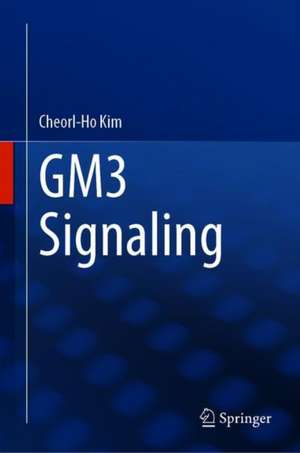GM3 Signaling
Autor Cheorl-Ho Kimen Limba Engleză Hardback – 10 iul 2020
| Toate formatele și edițiile | Preț | Express |
|---|---|---|
| Paperback (1) | 970.01 lei 38-44 zile | |
| Springer Nature Singapore – 10 iul 2021 | 970.01 lei 38-44 zile | |
| Hardback (1) | 983.42 lei 38-44 zile | |
| Springer Nature Singapore – 10 iul 2020 | 983.42 lei 38-44 zile |
Preț: 983.42 lei
Preț vechi: 1035.17 lei
-5% Nou
Puncte Express: 1475
Preț estimativ în valută:
188.17€ • 196.49$ • 155.39£
188.17€ • 196.49$ • 155.39£
Carte tipărită la comandă
Livrare economică 11-17 aprilie
Preluare comenzi: 021 569.72.76
Specificații
ISBN-13: 9789811556517
ISBN-10: 9811556512
Pagini: 138
Ilustrații: VII, 138 p. 32 illus., 26 illus. in color.
Dimensiuni: 155 x 235 mm
Greutate: 0.45 kg
Ediția:1st ed. 2020
Editura: Springer Nature Singapore
Colecția Springer
Locul publicării:Singapore, Singapore
ISBN-10: 9811556512
Pagini: 138
Ilustrații: VII, 138 p. 32 illus., 26 illus. in color.
Dimensiuni: 155 x 235 mm
Greutate: 0.45 kg
Ediția:1st ed. 2020
Editura: Springer Nature Singapore
Colecția Springer
Locul publicării:Singapore, Singapore
Cuprins
1. History of sialic acids, gangliosides and GM3.- 2. Synthesis of GM3.- 3. Molecular localization of GM3 in cells.- 4. Basic function of GM3 as an interacting molecule.- 5. GD3 mimetics with a neurite forming capacity.- 6. GM3 as a pathogenic infection receptor.- 7. GM3 and related gangliosides prevent inflammation and atherosclerosis.- 8. GM3 has an anti-tumor capacity.- 9. GM3 suppresses tumor angiogenesis.- 10. Interaction between EGFR and GM3.- 11. Membrane ganglioside-specific neuraminidase 3 (NEU3) regulates GM3 signaling.- 12. Regulation of GM3-mediated EGFR signaling by NEU3 sialidase.- 13. VEGFR-GM3 interaction in angiogenesis.- 14. GM3, competing with GM1, interaction with urokinase plasminogen activator receptor (uPAR) in endothelial caveolar-lipid rafts inhibits angiogenesis.- 15. GM3 interacts with TGFβ Rs in the epithelial-mesenchymal transition (EMT) during posterior capsular opacification (PCO) formation.- 16. Galectin-1 promotes tumor growth and escapes immune surveillance.- 17. GM3-HGFR, FGFR and PDGFR cancer cell behavior, and IGF-1R in diabetic wound healing.- 18. GM3, caveolin-1 and insulin receptor in insulin resistance.- 19. GM3 suppresses arthritis.- 20. GM3 protects cochlear hair cells and hearing from corti degeneration.- 21. GM3 increases osteoclast differentiation via direct GM3 cooperation with RANKL and IGF-1.- 22. GM3 in leukemic cells into terminal differentiation.- 23. α2,3-Sialyllactose (3SL) or α2,6-sialyllactose (6SL) of GM3 glycan in innate immunity.
Notă biografică
Prof. Cheorl-Ho Kim
Molecular and Cellular Glycobiology Unit, Department of Biological Sciences, Sungkyunkwan University
Molecular and Cellular Glycobiology Unit, Department of Biological Sciences, Sungkyunkwan University
Textul de pe ultima copertă
This book reviews recent progress in understanding of the signaling and biochemistry of GM3 ganglioside in eukaryotic cells. GM3 is the simplest of the gangliosides and the precursor of other gangliosides. It is expressed in the outer leaflet of plasma cell membranes and has roles in the recognition, interaction, binding, adhesion, and motility of cells. In addition, GM3 has been documented to have functional roles in cell migration, proliferation, senescence, and apoptosis. The full range of topics of interest are addressed in the book. The early chapters discuss the synthesis of GM3, its molecular localization in cells, and its basic function as an interacting molecule. The ways in which GM3 exerts its effects via various growth factor receptors are fully explored. Current knowledge of the part played by GM3 in health and disease is discussed in depth. For example, its roles in preventing inflammation, inhibiting tumor angiogenesis and tumor growth, and suppressing arthritis are highlighted, and attention drawn to the significance of GM3 as a driver of impaired wound healing in diabetics. The book will be of interest to all who want a comprehensive update on research in this field.
Caracteristici
Reviews recent progress in understanding of the signaling and biochemistry of GM3 ganglioside in eukaryotic cells
Explores the ways in which GM3 exerts its effects via various growth factor receptors
Examines the role of GM3 in health and disease
Explores the ways in which GM3 exerts its effects via various growth factor receptors
Examines the role of GM3 in health and disease
